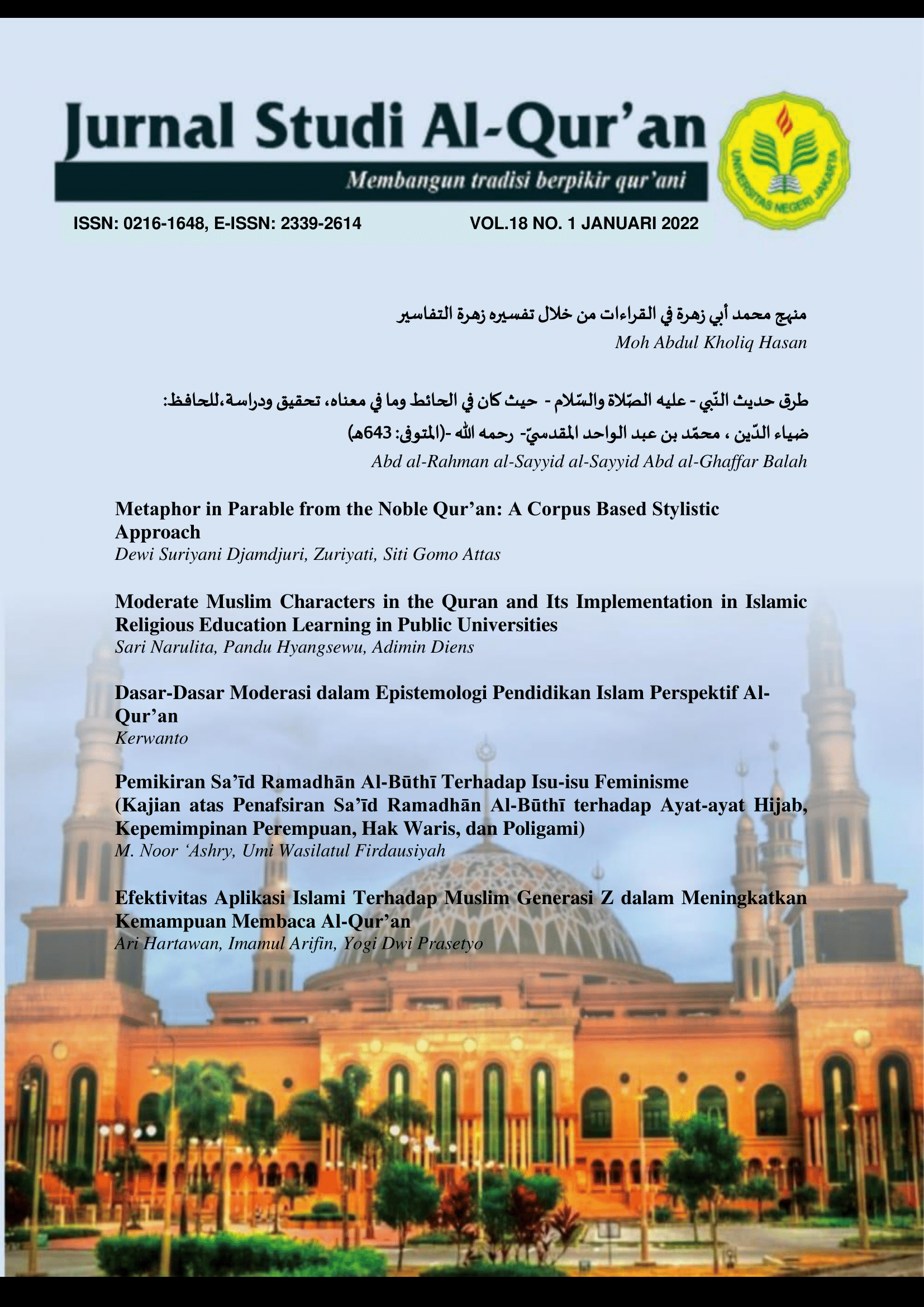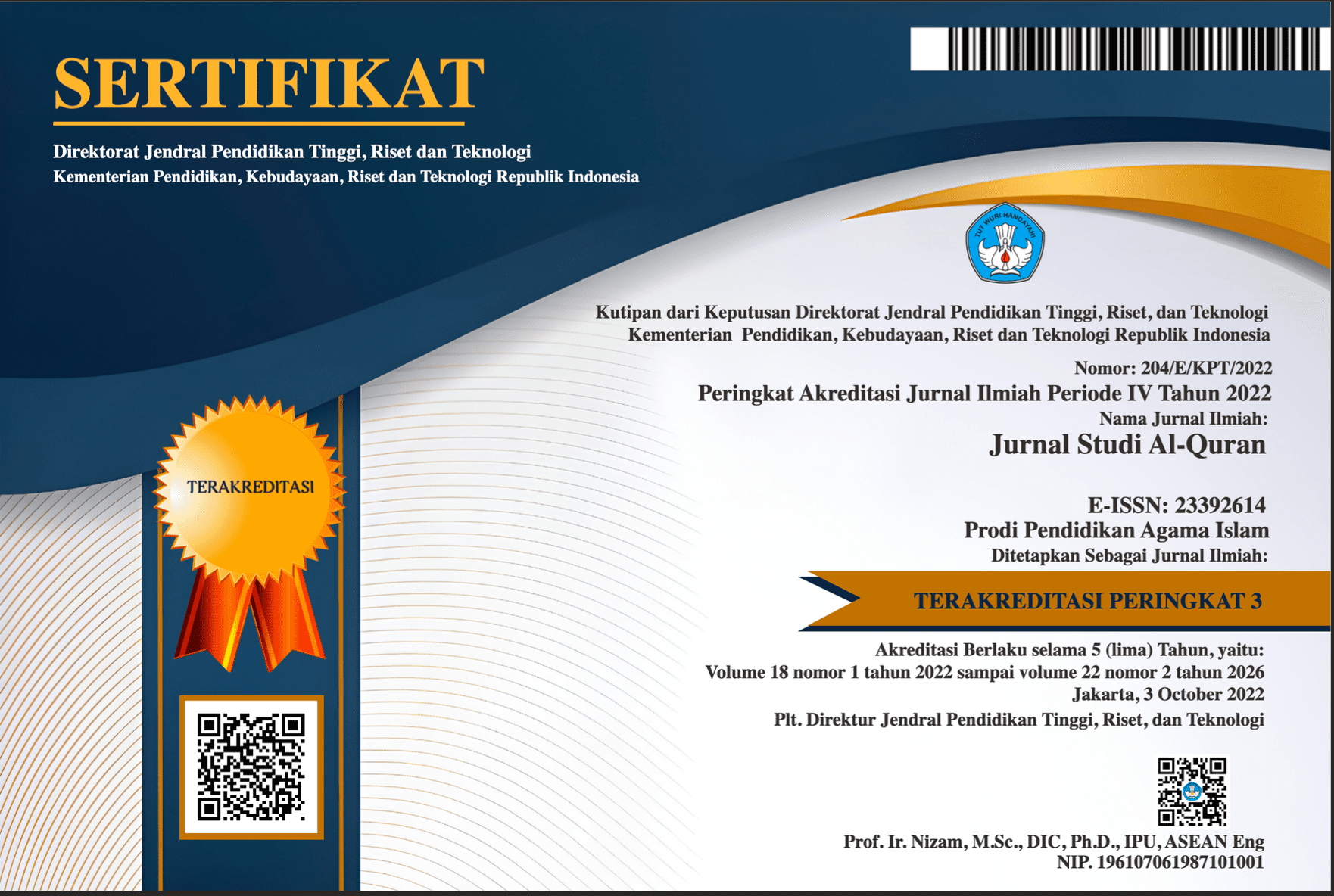Dasar-Dasar Moderasi dalam Epistemologi Pendidikan Islam Perspektif Al-Qur’an
DOI:
https://doi.org/10.21009/JSQ.018.1.05Keywords:
Epistemology of Islamic Education, Moderation, Human Reality, Morality, Family, Worship, Prayer.Abstract
This article explores the basics of moderation excavated from the verses of the Qur'an, which can be used as the epistemology of education in Islam. The critical value of this study is the critique of the epistemology of modern Western education, which ignores metaphysics as an approach and study in epistemology. Through this article, the author wants to make a description of the human ontology and its axiology from the perspective of the Qur'an as an epistemological foundation in education. It is urgent to do this because the basics of educational epistemology cannot be separated from the human perspective on ontology and axiology. Through the analysis of the verses of the Qur'an, it is illustrated that humans are created in moderation. The dimensions inherent in the reality of human ontology- such as exoteric-esoteric, physical-spiritual, physical-metaphysical, individual (private)-social aspects- are given serious attention by the Qur'an and placed in their respective positions. Another interesting discussion in this article is a description of the ethical-axiological values of a moderate Al-Qur'an perspective, such as the influence of morality, family, worship and prayer on the development of human physical and spiritual aspects. Regarding the research approach, this article can be called a thematic interpretation study because the author tries to collect the verses of the Qur'an in a specific theme and then examines the interrelationships between these verses to produce a general concept.
References
Āmulī, Ḥaidar al-. Asrār al-Sharīah wa Aṭwār al-Ṭarīqah wa Anwār al-Ḥaqīqah. Beirut- Lebanon: Dār al-Mahajja al-Baidhā, 2012.
Ash’ath, Abū Dawūd Sulaimān Ibn al-. Sunan Abī Dawūd. Beirut: Dār al-Kitāb al-‘Arabī, Vol. 3.
Attas, Syed Muhammad Naquib al-. Prolegomena to The Metaphysics of Islam An Exposition of The Fundamental Elements of The Worldview of Islam. Kuala Lumpur, Malaysia: ISTAC, 1995.
Baihaqī, Aḥmad Ibn al-Ḥusein Ibn ‘Alī Ibn Mūsā Abū Bakar al-. Sunan al-Baihaqī. Mekkah al-Mukkaramah: Maktabah Dār al-Bāz, 1994, Vol. 10.
Bakir, M. , & Othman, K. A Conceptual Analysis of Wasatiyyah (Islamic Moderation-IM) from Islamic Knowledge Management (IKM) Perspectives, Revelation and Science, vol. 07, no. 01 (1438H/2017). https://journals.umt.edu.pk/index.php/JITC/article/view/79.
Effendi, M. R. (2020). Mitigasi Intoleransi dan Radikalisme Beragama di Pondok Pesantren Melalui Pendekatan Pembelajaran Inklusif. Paedagogie, I(I), 55–74. https://doi.org/doi.org/10.20211/pdg.01.1.05
Effendi, M. R. (2021). Teologi Islam; Potret Sejarah dan Perkembangan Mazhab KAlam. Literasi Nusantara.
Farmawi, Abdul Hayy Al-. Metode tafsir Maudhu’I dan cara penerapannya. Jakarta: PT. Raja Grafindo persada, 1994.
Fauzi, Ahmad. Moderasi Islam untuk Peradaban dan Kemanusiaan, Jurnal Islam Nusantara, vol. 02, no. 02, (Juli-Desember 2018). https://www.jurnalnu.com/index.php/as/article/view/101.
Hakim, Lukman al-. Sabīl al-Irādah fī Sharḥi Kīmīyā al-Sa’ādah li al-Imām al-Ghazālī. Depok-Indonesia: Maktabah Al-Turmusy Litturots, 2021.
Ḫambal, Aḫmad Ibn. Musnad Aḫmad. Muassasah ar-Risâlah, 1999 M/ 1420 H, Vol. 14.
Hasan, Mustaqim. Prinsip Moderasi beragama dalam kehidupan berbangsa. Jurnal Mubtadiin, vol. 7, no. 02 (Juli-Desember 2021). https://journal.an-nur.ac.id/index.php/mubtadiin/article/view/104.
Jailanī, ‘Abdulqādir al-. Sir al-Asrār wa Muḍhir al-Anwār fīmā Yaḥtāj ilaihi al-Abrār. Beirut: Dār al-Kutub al-‘Ilmiah, 1428 H.
Kerwanto. Studi Tafsir Mulla Sadra: Interpretasi Filosofis terhadap Prinsip Agama dalam Surat al-A’lā. Malang: Pustaka Sophia, 2019.
Makki. Epistemologi Pendidikan Islam: Memutus Dominasi Barat terhadap Pendidikan Islam. Al-Musannif, Vol. 1, No. 2 (Juli-Desember 2019). https://jurnal.mtsddicilellang.sch.id/index.php/al-musannif/article/view/26.
Mībadī, Muḥammad Fākir Al-. Qawāid al-Tafsīr Ladā al-Shūah wa al-Sunnah.Tehrān: al-majma’ al-‘ālamī li Taqrīb Bain al-Madhāhib al-Islāmiah, 2007.
Muhamad Ridwan Effendi, Rudi M. Barnansyah, S. N. (2019). Model Pendidikan Inklusif Pondok Pesantren. Laboratorium PAI FIS UNJ. https://seminars.unj.ac.id/icic/
Mushlihin, M., Narulita, S., & Aulia, R. N. (2021). Education and the formation of Islam Nusantara: Epistemology, Direction and Sustainability. Hayula: Indonesian Journal of Multidisciplinary Islamic Studies, 5(2), 261-270.
Muṣtafawī, Ḥasan al-. al-Taḥqīq fī Kalimāt al-Qurān al-Karīm. Beirut: Dār al-Kutub al-‘Amaliah wa Turāth al-‘Allāmah al-Muṣtafawī.
Muthahhari, Ayatullah Murtadha. Dasar-Dasar Epistemologi Pendidikan Islam: Teori Nalar dan Pengembangan Potensi serta Analisa Etika dalam Program Pendidikan. Jakarta: Sadra Press, Oktober 2011.
Narulita, S., Humaidi, H., Mushlihin, M., Aulia, R. N., & Hidayat, A. A. (2019, October). UNJ STUDENTS’RELIGIOUS LITERACY. In Proceeding ASEAN Youth Conference.
Permana, D. S., Rachmat, N., & Ismail, Y. (2014). Potret Sikap Toleransi Beragama Siswa. Jurnal Studi Al-Qur’an , 10(2), 168 - 177.
Ṣadrā, Mullā. al-Maẓāhir al-Ilāhiyah fī Asrār al-‘Ulūm al-Kamāliyyah. Tehran: Bonyad Hikmat Sadra Publishers.
Sassi, Komaruddin. Prinsip-Prinsip Epistemologi Pendidiksan Islam Paradigma Tauhid Naquib al-Attas. Millah: Jurnal Studi Agama, Vol. 20, no. 1 (2020). https://journal.uii.ac.id/Millah/article/view/15370.
Shīrazī, Nāsir Makaraim. Nafaḥāt al-Qur’ān: Uslūb Jadīd fi al-Tafsīr al-Maudhūī. Qum: Madrasah al-Imām ‘Ālī Ibn Abī Thālib, 1426 H.
Shīrāzī, Nāṣir Makārim. al-Amthal fī Tafsīr Kitābillāh al-Munazzil. Qum: Manshūrāt Madrasah al-Imām ‘Alī Ibn Abī Ṭālib, 1421 H, Vol. 1, 2 dan 3.
Suyūṭī, Jalāluddīn al-. al-Dur al-Manthūr fī Tafsīr al-Mathūr. Qum: Maktabah Āyatullāh al-Mu’ishī al-Najafī, 1400 H, Vol. 6.
Ṭabāṭabā’ī, Muḥammad Ḥusein al-. al-Mīzān fī Tafsīr al-Qurān. Qum: Muassasah al-Nashr al-Islāmī li Jamā’ah al-Madrasatain fī al-Ḥauzah, 1417 H, Vol. 8.
Downloads
Published
How to Cite
Issue
Section
License
Authors who publish with this Journal agree to the following terms:
- Author retain copyright and grant the journal right of first publication with the work simultaneously licensed under a creative commons attribution licensethat allow others to share the work within an acknowledgement of the work’s authorship and initial publication of this journal.
- Authors are able to enter into separate, additional contractual arrangementfor the non-exclusive distribution of the journal’s published version of the work (e.g. acknowledgement of its initial publication in this journal).
- Authors are permitted and encouraged to post their work online(e.g. in institutional repositories or on their websites) prior to and during the submission process, as it can lead to productive exchanges, as well as earlier and greater citation of published works.
Users/public use of this website will be licensed to CC BY










